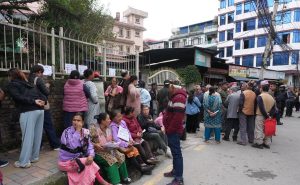The Nepali Congress has decided to study and document the Gen Z demonstrations held on Bhadra 23 and 24, along with the political developments that followed. The decision was made during the Central Committee meeting held on Saturday in Sanepa under the chairmanship of Acting President Purna Bahadur Khadka, according to a statement issued by Chief Secretary Krishna Prasad Paudel.
The statement said the party would conduct a detailed analysis of the Gen Z protests, consult stakeholders inside and outside the organization, and prepare an official report. The Congress stated that the country is currently facing a serious political crisis.
The party said all Nepalis must confront the situation with unity and patience. It noted that national challenges in the past were resolved through collective strength and foresight, and emphasized cooperation to protect national independence, sovereignty, fundamental rights, and the implementation of the Constitution.
The Nepali Congress also urged political parties, civil society, intellectuals, and media professionals to adopt dialogue, restraint, and mutual understanding. According to the party, the demonstrations organized on Bhadra 23 by Gen Z youths against corruption and in support of good governance resulted in a tragic incident.
The Congress expressed deep sorrow over the deaths of 19 youths on that day. It offered condolences to the victims, wished peace for the departed souls, and extended sympathy to the bereaved families. The party demanded appropriate compensation for the families, free medical treatment for the injured, and wished for their speedy recovery.
The Congress said the attacks, vandalism, looting, and arson on Bhadra 24 caused unprecedented loss of life and property. A total of 57 people—including protesters and security personnel—were killed, and hundreds were injured. The party said the violent events created a state of lawlessness and anarchy.
According to the statement, several institutions—including the President’s Office, Singha Durbar, Parliament building, Supreme Court, ministries, the Commission for the Investigation of Abuse of Authority, courts, land revenue offices, provincial and local government offices, police stations, historic structures, the Koirala residence in Biratnagar, the Ganeshman Singh residence in Chaksibari, the Krishna Prasad Bhattarai Ashram in Bhangeda, the Nepali Congress central office, party offices in 48 districts, private homes of more than 125 leaders, offices of other political parties, business establishments, and private properties—were attacked, vandalized, looted, or set on fire. The Congress described these incidents as apolitical, criminal, and destructive.
The party said the major concerns raised by the Gen Z movement—including ending corruption, ensuring good governance, promoting transparency, and securing the right to information—were legitimate and represented the public voice. The statement reaffirmed that the Congress has always taken such demands positively and remains committed to addressing them.







